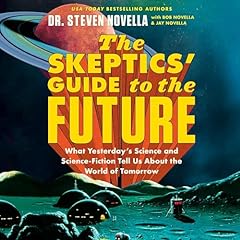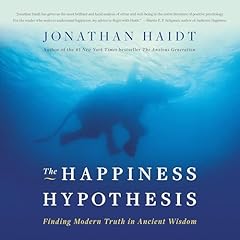
Touching a Nerve
The Self as Brain
No se pudo agregar al carrito
Add to Cart failed.
Error al Agregar a Lista de Deseos.
Error al eliminar de la lista de deseos.
Error al añadir a tu biblioteca
Error al seguir el podcast
Error al dejar de seguir el podcast
Obtén 3 meses por US$0.99 al mes
 Exclusivo para miembros Prime: ¿Nuevo en Audible? Obtén 2 audiolibros gratis con tu prueba.
Exclusivo para miembros Prime: ¿Nuevo en Audible? Obtén 2 audiolibros gratis con tu prueba.
Compra ahora por $20.56
-
Narrado por:
-
Karen Saltus
A trailblazing philosopher's exploration of the latest brain science - and its ethical and practical implications.
What happens when we accept that everything we feel and think stems not from an immaterial spirit but from electrical and chemical activity in our brains? In this thought-provoking narrative - drawn from professional expertise as well as personal life experiences - trailblazing neurophilosopher Patricia S. Churchland grounds the philosophy of mind in the essential ingredients of biology. She reflects with humor on how she came to harmonize science and philosophy, the mind and the brain, abstract ideals and daily life.
Offering lucid explanations of the neural workings that underlie identity, she reveals how the latest research into consciousness, memory, and free will can help us reexamine enduring philosophical, ethical, and spiritual questions: What shapes our personalities? How do we account for near-death experiences? How do we make decisions? And why do we feel empathy for others? Recent scientific discoveries also provide insights into a fascinating range of real-world dilemmas - for example, whether an adolescent can be held responsible for his actions and whether a patient in a coma can be considered a self.
Churchland appreciates that the brain-based understanding of the mind can unnerve even our greatest thinkers. At a conference she attended, a prominent philosopher cried out, "I hate the brain; I hate the brain!" But as Churchland shows, he need not feel this way. Accepting that our brains are the basis of who we are liberates us from the shackles of superstition. It allows us to take ourselves seriously as a product of evolved mechanisms, past experiences, and social influences. And it gives us hope that we can fix some grievous conditions, and when we cannot, we can at least understand them with compassion.
Download the accompanying reference guide.©2013 Patricia S. Churchland (P)2013 Gildan Media LLCLos oyentes también disfrutaron:




















Reseñas de la Crítica
Las personas que vieron esto también vieron:

I wanted to say I did not regrete. Cos it did help me firm up ideas on gender and free will, but it is mild disappointing how the content is structured. Aka the balance of science and philosophy. Overall it is laudable effort in a field which needs refreshing .
Mildly disappointing
Se ha producido un error. Vuelve a intentarlo dentro de unos minutos.
Would you recommend this audiobook to a friend? If so, why?
This is a heroic attempt to summarize what we know about who we are, why we're here, and why we do the things we do. It is an attempt to "stand in the truth" which is very challenging to our deeply held desire to be metaphysical beings or something other than biological brains in an all too physical body.What other book might you compare Touching a Nerve to and why?
The God Delusion, also written by a biologist (Richard Dawkins), also resisting the pull to superstition and pseudoscience.What three words best describe Karen Saltus’s voice?
Unfortunately preachy, but clear.What’s the most interesting tidbit you’ve picked up from this book?
The orchestra of hormones that regulate human aggression.Any additional comments?
Standing in the truth is hard work, but rewarding.The plainspoken truth about who we really are
Se ha producido un error. Vuelve a intentarlo dentro de unos minutos.
This book looks at the 'hard problem' of consciousness and goes about systematically explaining why it should never be considered unsolvable or classified as the 'hard problem' and how significant progress is currently being made in the field and for which is best explained to layman by a Neuro-Philosopher such as the author is instead of by a neuroscientist.
She writes in a very conversational manner and excels at story telling. The book really comes alive when she gives real life stories from her past. But, make no mistake, she doesn't dance around explaining difficult concepts about evolution, genetics, brain functions, and even the common fallacies you'll often hear which over simplify about race (such as the truly vile book by Nicolas Wade, 'A Troublesome Inheritance'), gender identity and free will. She did point out in the book that Daniel Dennett (whose books I love and have listened to on Audible) is wrong when he says that consciousness needs language. I still love Dennett but Churchland is right on the points she made.
Overall a very sophisticated book written in a conversational manner even while covering hard to understand topics.
Mind explained by what we know not magic
Se ha producido un error. Vuelve a intentarlo dentro de unos minutos.
Pretty good, a little dense, could really use a different narrator
Se ha producido un error. Vuelve a intentarlo dentro de unos minutos.
If you could sum up Touching a Nerve in three words, what would they be?
Neuroscience for everbodyWhat was the most compelling aspect of this narrative?
“Rock on Berti!” (Bertrand Russell). I like being able to cry at the ending of Anna Karenina and Dr. Schiwago, but I also enjoy shedding a tear or two after the final paragraphs of a well-written science book.Neurophilosopher Patricia Churchland (according to Wikipedia an eliminative materialist), composes beautifully clear, straightforward sentences, and, in true story telling style, transports us to the cutting edge of neuroscience. I decided to finally read Patricia Churchland to protect myself against the temptations of quantum neuroscience, for which I have a strange liking that may well be more artistic than scientific.
The book (I actually listened to it as an audiobook while jogging and cleaning) summarizes the current state of neuroscience including the latest research into consciousness, memory, and free will, as Churchland examines their relationship to contemporary philosophical, ethical, and spiritual questions. There is nothing breathtakingly new to somebody who follows the field on a regular basis; for (neuro)scientists quite a bit is old hat, e.g. how neurons work. Yet it is written in such a comprehensible style that it rejuvenates and replenishes the old memory bank – very useful for science journalists.
There are a couple of topics I slightly disagree with, and I find her somewhat conservative (e.g. difference between man and woman). But I guess if I want a more visionary approach I should read science fiction.
I liked the way she ties her ideas to her upbringing on a farm, bringing highflying neurophilosophical thoughts down to earth. My attention wandered when it came to paragraphs obviously directed at science-skeptics. I guess this is directed more towards US readers. In short: a great (audio-)book for anybody, especially laypeople interested in a good overview of neuroscience. Rock on Pat.
Rock on Pat
Se ha producido un error. Vuelve a intentarlo dentro de unos minutos.


